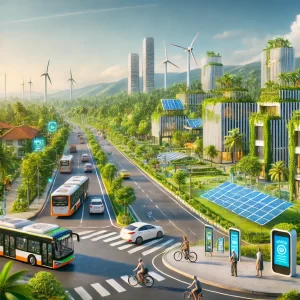
The Vision Behind Kerala’s Smart Cities
The Smart Cities Mission, launched by the Government of India, envisions urban spaces that are citizen-friendly, technologically advanced, and environmentally sustainable. Kerala embraced this mission with a forward-thinking approach, integrating smart solutions tailored to the state’s unique geography and socio-economic landscape.
The primary goals of Kerala’s Smart City initiatives include:
- Enhancing urban infrastructure and connectivity
- Promoting sustainable energy and waste management
- Improving healthcare, education, and public services
- Boosting economic opportunities and innovation
- Preserving Kerala’s cultural heritage and natural beauty
With these goals in mind, several cities in Kerala, including Kochi, Thiruvananthapuram, and Kozhikode, have launched smart projects designed to create cleaner, greener, and more efficient urban environments.
Kochi: A Pioneer in Smart City Development
Kochi, Kerala’s commercial capital, leads the charge in the state’s smart city movement. Under the Kochi Smart City project, the city has adopted various eco-friendly and technology-driven solutions to enhance urban living.
- Integrated Transport System: Kochi’s multi-modal transport system seamlessly connects buses, ferries, and the Kochi Metro. The ‘One Card’ initiative allows commuters to use a single card for all transport modes, promoting public transportation and reducing reliance on private vehicles.
- Smart Water Management: To tackle water scarcity and flooding, Kochi implemented smart water meters, rainwater harvesting systems, and flood monitoring technology. This ensures efficient water use and better disaster management.
- Waste-to-Energy Plants: The city’s advanced waste management systems convert organic waste into biogas and electricity. This not only reduces landfill pressure but also contributes to clean energy production.
- Digital Infrastructure: Public Wi-Fi hotspots, smart street lighting, and CCTV surveillance have enhanced connectivity and security across the city.
Thiruvananthapuram: Bridging Tradition and Technology
Kerala’s capital city, Thiruvananthapuram, is blending its rich cultural heritage with smart innovations. The city focuses on sustainable development while preserving its historical charm.
- Solar-Powered Infrastructure: Government buildings, streetlights, and public spaces now harness solar energy, reducing the city’s carbon footprint.
- Smart Healthcare Services: E-health services, telemedicine, and digital health records make healthcare more accessible and efficient for residents.
- Eco-Mobility: Electric buses and cycle-sharing programs encourage greener transportation, reducing air pollution and traffic congestion.
- Heritage Conservation: Thiruvananthapuram integrates smart lighting and guided virtual tours at heritage sites, promoting tourism while protecting historic landmarks.
Kozhikode: Innovation and Community Engagement
Kozhikode, known for its vibrant culture and entrepreneurial spirit, is emerging as a model of community-driven smart city development.
- Green Public Spaces: The city has transformed underutilized areas into parks, playgrounds, and urban forests, fostering community interaction and improving air quality.
- Smart Waste Collection: Real-time tracking systems ensure efficient waste collection and segregation, minimizing environmental impact.
- Start-Up Ecosystem: Kozhikode supports innovation hubs and incubators, empowering local entrepreneurs to develop smart solutions for urban challenges.
- Digital Literacy Initiatives: The city offers skill development programs to enhance digital literacy, ensuring citizens actively participate in the smart city transformation.
Sustainability at the Core of Kerala’s Smart Cities
Kerala’s smart city initiatives prioritize sustainability, recognizing that technological advancement must go hand-in-hand with environmental responsibility. Key sustainable strategies include:
- Renewable Energy Integration: Solar panels, biogas plants, and wind energy projects are being integrated into urban infrastructure.
- Energy-Efficient Buildings: Smart cities in Kerala promote green buildings with energy-efficient designs, natural ventilation, and rainwater harvesting systems.
- Eco-Friendly Transportation: Electric vehicles, pedestrian-friendly pathways, and public transport upgrades reduce carbon emissions and traffic congestion.
- Smart Waste Management: Automated waste collection, composting units, and recycling plants ensure minimal waste ends up in landfills.
- Water Conservation: Sensor-based water systems, rainwater harvesting, and wastewater recycling support sustainable water management.
Challenges and the Road Ahead
While Kerala’s smart city initiatives show remarkable progress, challenges remain. Urban areas face issues like rapid population growth, infrastructure strain, and climate vulnerability. Moreover, ensuring digital inclusivity and community participation is crucial for long-term success.
The state’s commitment to innovation, sustainability, and citizen welfare, however, provides a strong foundation for overcoming these hurdles. Future projects may include smart grids for efficient energy distribution, AI-driven traffic management, and further expansion of renewable energy resources.
Conclusion
Kerala’s Smart City initiatives mark a bold step toward creating sustainable, technology-driven urban spaces. By merging innovation with environmental consciousness, the state not only improves the quality of life for its residents but also sets a blueprint for other regions to follow. As Kerala continues this journey, its smart cities serve as a shining example of how modern urban development can harmonize with nature, tradition, and community well-being.
With sustainability at its heart, Kerala’s transformation proves that smart cities are not just about technology — they’re about building a smarter, greener, and more inclusive future for all.
